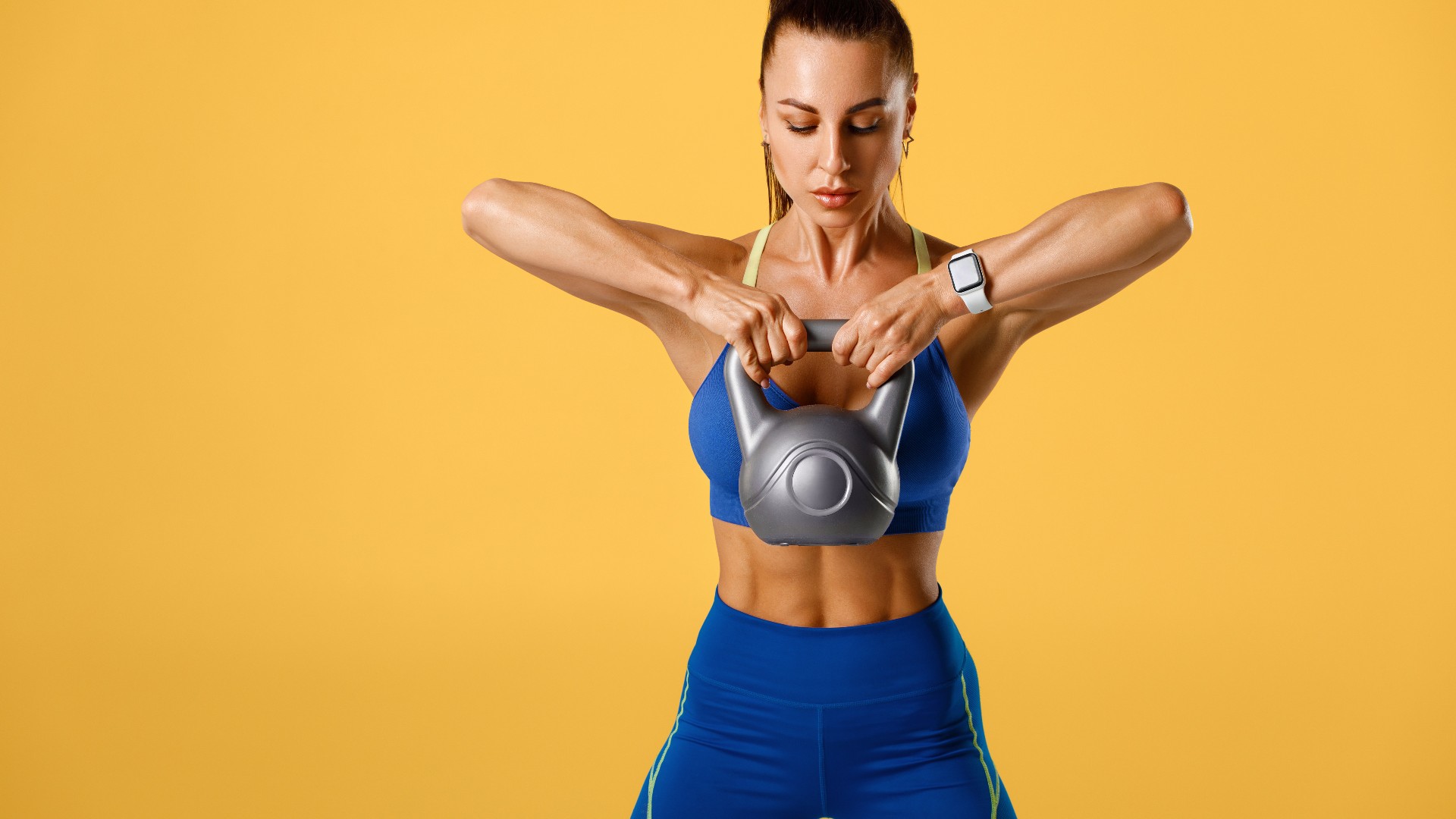
If you’re searching for a full-body workout, you just need 20 minutes and these four kettlebell exercises to strengthen muscles everywhere, including your back, chest, arms, shoulders, core and legs.
As a personal trainer, I just can’t help but get inspired during home workouts with weights, and for this one, you only need one or two of the best kettlebells for weightlifting and home workouts.
Our Tom’s Guide exclusive full-body kettlebell workout is the perfect solution for those short on time, equipment and space and torches the major muscle groups using four beginner-friendly moves.
Read on for each kettlebell exercise, how to do the 20-minute workout and our tips to maximize each movement. But remember, if you’re new to exercise or returning from injury, check your form with a personal trainer or speak with a medical professional first and stop if you experience pain.
There’s no shortage of muscle-torching exercises that hit several muscle groups at once. These are called compound exercises, and we’ve listed the best compound exercises to try here.
Put aside 20 minutes and one kettlebell and try these four kettlebell exercises. The goal is efficiency, so these moves help build strength and muscle, burn calories and tap into cardio exercise without spending hours in the gym.
They also slot into functional training programs, working muscles through pushes, squats and swings that reflect how you naturally move throughout the day.
Get instant access to breaking news, the hottest reviews, great deals and helpful tips.
20-minute, 4-move kettlebell EMOM workout
Perform the exercises as a 20-minute EMOM — every minute on the minute. Aim to reach 8-12 reps per exercise, resting for the remainder of the minute. Start the next exercise on the minute and complete 5 rounds.
We recommend leaving 10-15 seconds for rest. If you finish long before 50 seconds, add more reps or lift a heavier weight that helps you reach fatigue on the last reps.
Kettlebell swing
The kettlebell swing primarily strengthens the muscles in the posterior chain — the lower back, glutes, core, hips and hamstrings. To do the move, stand with one kettlebell between both feet and grip it with both hands. Keep a flat back and engage your core, swing the weight between your legs, snap your hips forward and drive the bell up to shoulder height, controlling the descent back down.
Learn how to do a kettlebell swing in more detail here.
Kettlebell thrusters
Thrusters are an advanced full-body exercise, so start light, holding one weight in both hands before progressing to two. Rack the weights to your shoulders, pointing your elbows slightly upward. Squeeze your core, then squat down, keeping a flat back and neutral spine. Push through both heels to stand and push the weights overhead as you do. Lock your elbows at the top.
Sumo kettlebell goblet squat
Start standing with your feet wider than shoulder-width apart, toes pointed out at 45 degrees and heels slightly turned in. Hold a kettlebell in both hands and brace your core muscles. Squat down, keeping a flat back and neutral spine, then push upwards and squeeze your glutes at the top of the move. This move is tough on the glutes, quads and hamstrings and activates your core.
Our writer did 100 goblet squats every day for a week and here's what happened for more detail on how to do the move.
American kettlebell swing
Like Russian kettlebell swings, the variation targets the posterior chain muscles. This time, you’ll swing the weight above your head. The added range of motion activates more of the shoulders, back and core muscles to keep the weight stable.
Perform the kettlebell swing, then at shoulder height, continue traveling the bell above your head, driving the biceps behind your ears, and control the descent back down between the legs.
Find out what happened when we attempted 90 American kettlebell swings every day for a week here.
Use these rep ranges above as guidelines and work to your fitness level. Nobody else can take the DOMS off your hands! Watch the video for each exercise first. For a longer workout, simply add rounds.
More from Tom's Guide
- I did Leaning Camel exercises every day — here’s what happened to my body
- Forget sit-ups — 9 kettlebell ab exercises that will torch your core
- Forget push-ups — 7 best dumbbell shoulder exercises to sculpt muscle definition.

Sam Hopes is a level 3 qualified trainer, a level 2 Reiki practitioner and fitness editor at Tom's Guide. She is also currently undertaking her Yoga For Athletes training course.
Sam has written for various fitness brands and websites over the years and has experience across brands at Future, such as Live Science, Fit&Well, Coach, and T3.
Having coached at fitness studios like F45 and Virgin Active and personal trained, Sam now primarily teaches outdoor bootcamps, bodyweight, calisthenics and kettlebells.
She also coaches mobility and flexibility classes several times a week and believes that true strength comes from a holistic approach to training your body.
Sam has completed two mixed doubles Hyrox competitions in London and the Netherlands and finished her first doubles attempt in 1:11.
 Club Benefits
Club Benefits





